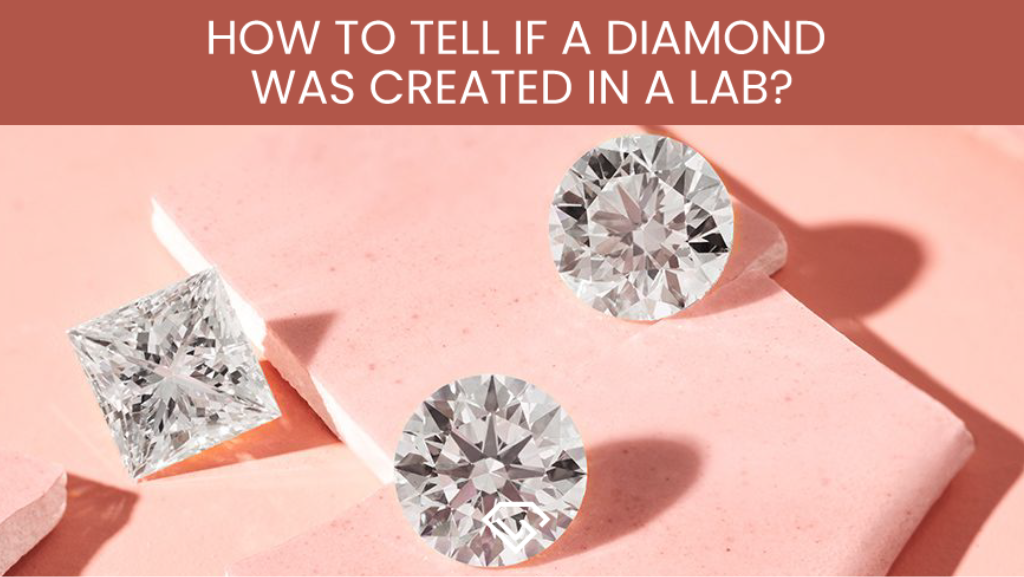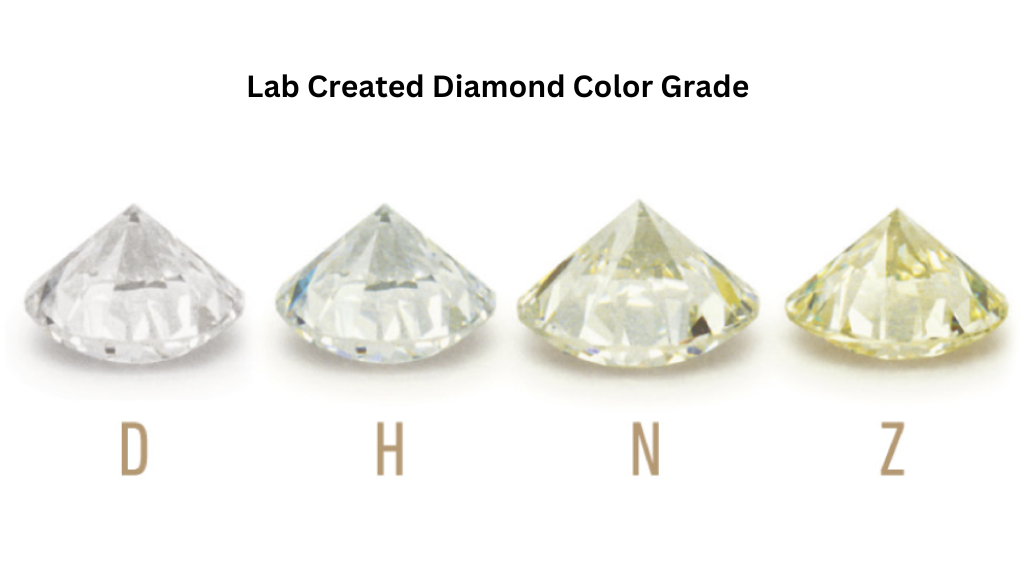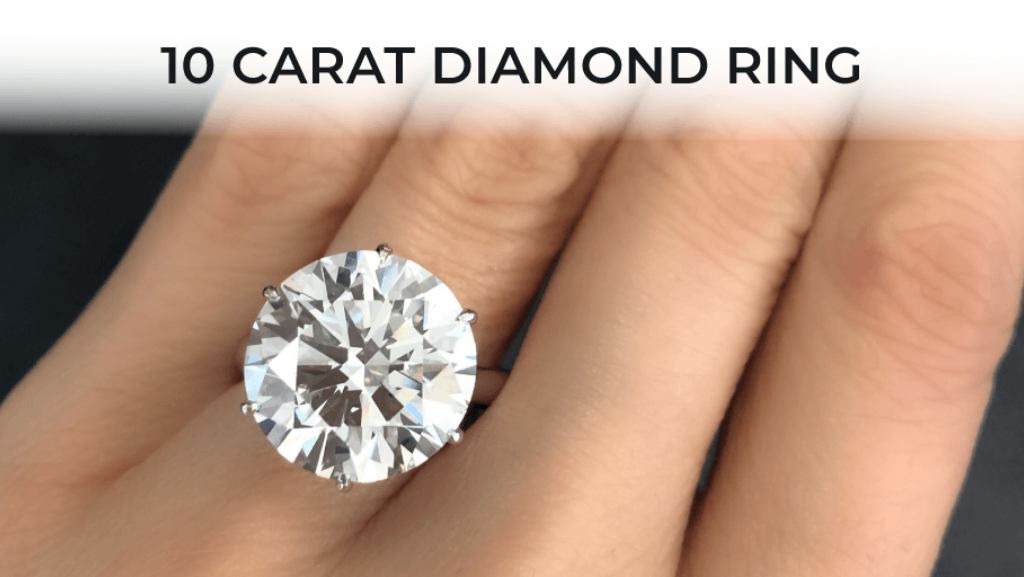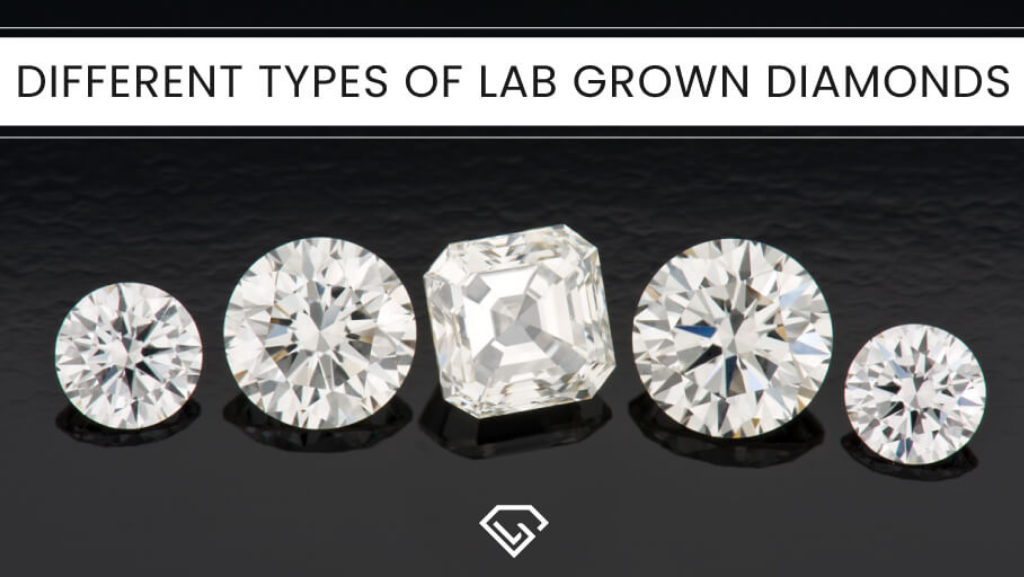Lab Grown Diamonds Resale Value: Everything you Need to know
Lab Grown Diamonds are generally diamonds that are produced in labs. Such diamonds are made in concentrated environments that replicate the real environment to produce similar diamonds at a very discounted price. Diamonds can mean a promise for some, while a small step into a sustainable future/survival or an investment.
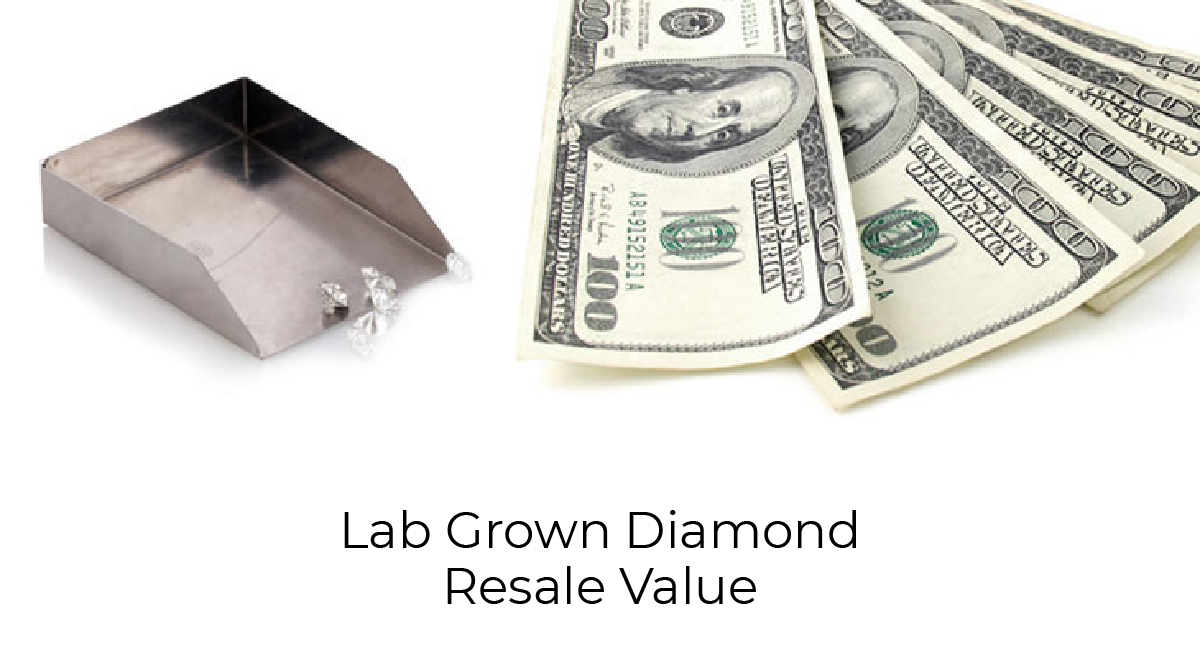
Be it in any scenario, before you buy the diamond, one should consider many factors like insurance, the diamond resale value, and the diamond’s lifespan. This not only ensures the deal one is making but also safeguards your money and provides assurance.
What is a lab created diamond?
A lab-created diamond is basically a stone that has been created in a laboratory instead of being mined from the ground. These diamonds are not found under the surface of the earth, rather they are manufactured using artificial processes like HPHT and CVD on the surface of the Earth.
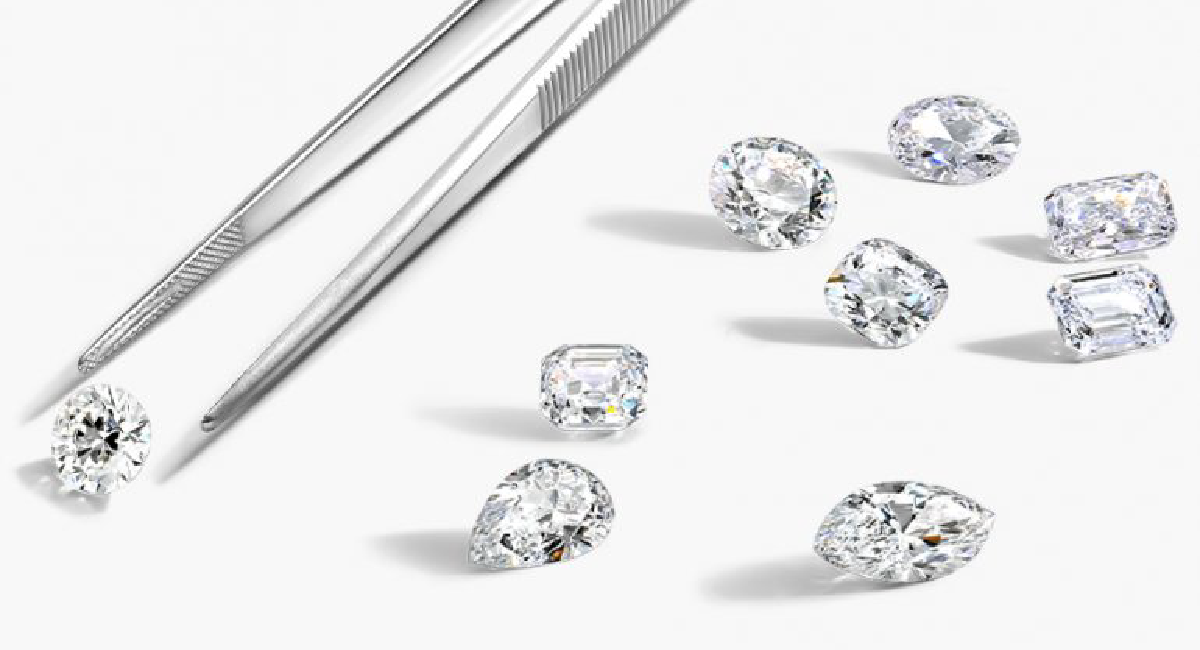
Chemically speaking, they are no different than mined diamonds. All the physical, optical, and chemical properties of lab-created diamonds are similar to natural diamonds.
Does Resale Value of Lab-Created Diamonds Exist?
The resale value of lab-created diamonds is either non-existent or extremely low. The resemblance might be uncanny to that of a real diamond but certifiers can easily distinguish between them very easily. It is said that the truth of the diamond lies in its girdle. Lab-grown diamonds have an inscription made on the girdle of a diamond to mark that they have been created in labs.
The Problem With Reselling Diamonds
It is very difficult to know how much the diamond is worth because It is very rare that a diamond’s resale price appreciates over time. Most of the diamonds are sold at lower rates as compared to what they were bought for. Retailers have access to multiple merchants that sell diamonds that are identical to yours at lesser costs.
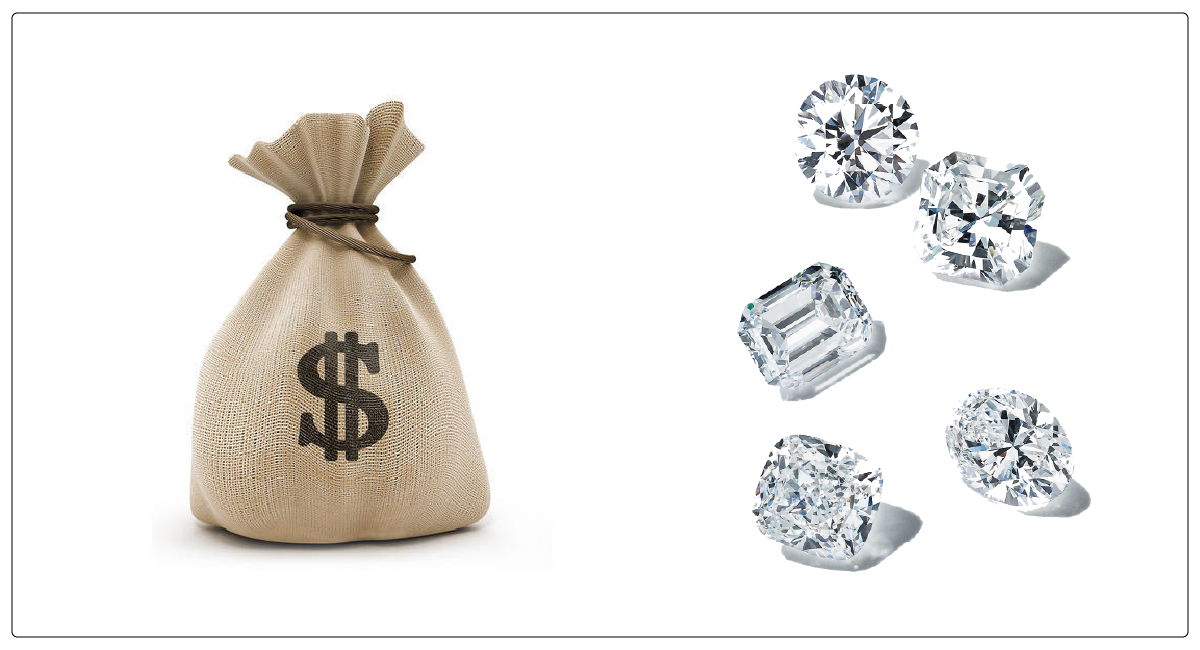
Since diamond merchants frequently price diamonds higher for the typical customer, jewelers with exposure to far cheaper rates find the pricing to be too excessive. In this circumstance, it’s almost certain that you’ll get less money for your stone than you paid for it.
To sum everything up it can be hard to get the price one originally paid until the diamond is extremely rare or special such as the Kohinoor or a fancy-colored diamond and when we compare the resale value between real and lab-created the difference is quite slim.
Factors that Determine the Diamond Resale Value
The resale price of a diamond is primarily influenced by three things.
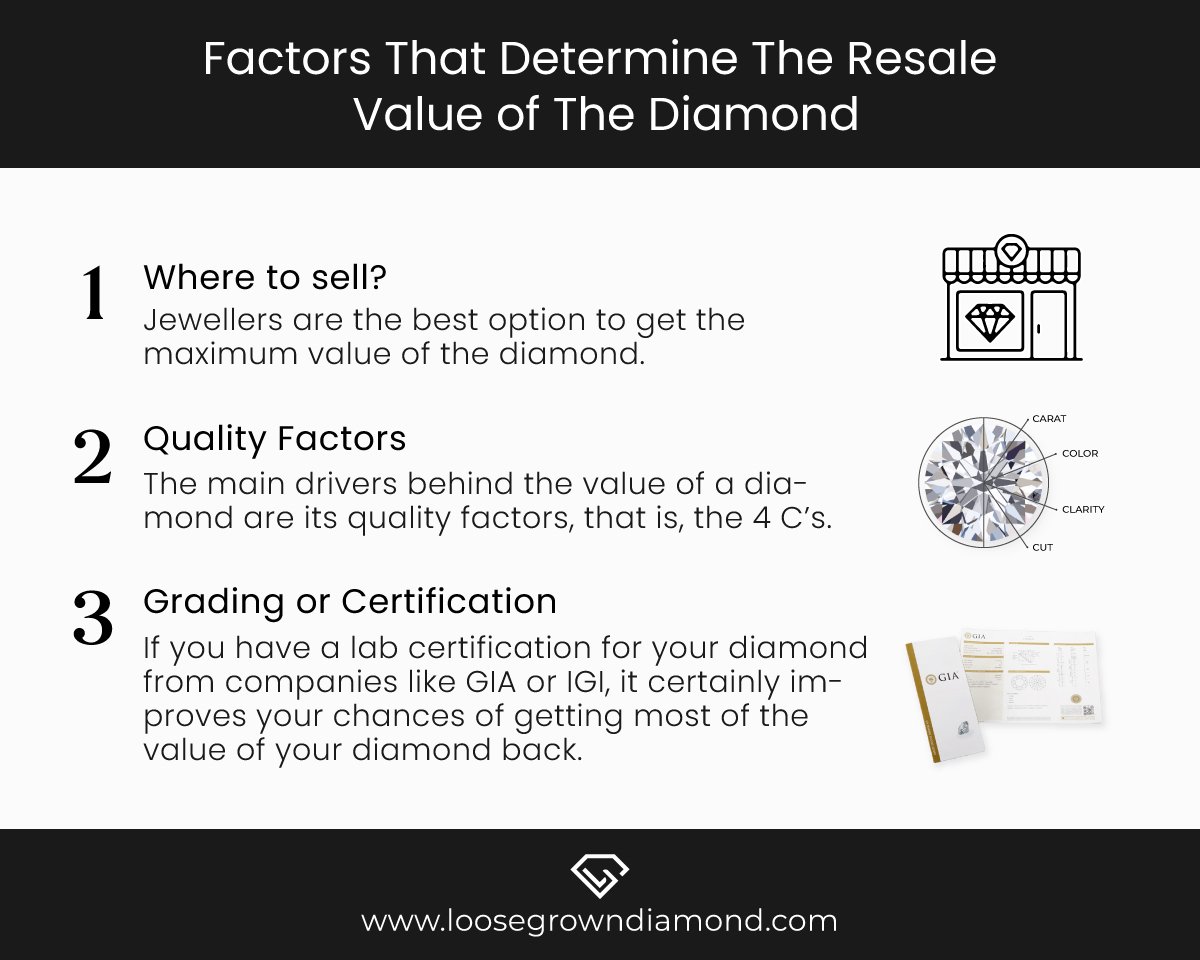
Where One Sells the Diamond
This factor heavily influences the resale price as you might get a better value in some online platforms than others. Few of them might include
Jewelers
Except for some frequent drawbacks, jewelers might be a great place to resale a lab-created engagement ring.
Many people are still wary about lab-grown gems because they don’t want them to compete with mined stone prices.
They are able to purchase goods from their suppliers at competitive costs and with favorable payment conditions. As a result, they’re less likely to pay cash in advance for your gem.
To sell to a jeweler, you’d have to offer a very steep discount to entice them to part with cash upfront. As a result, jewelers are unlikely to get you the best potential sale price.
Certification
Certification statements from reputable certifying labs such as GIA and IGI provide a lot of information and assurance about a diamond’s status and attributes. It effectively proves that the stone is worth the amount you estimate it is. If one does not already have it, they can make one which normally ranges from $75-$150. Getting your diamond verified is usually a good idea.
4C’s
The quality of the diamond is decided by the 4C’s. The higher the score, the greater the resale value of diamonds.
- Color
The more extreme the color the more resale value it provides. The rarity of the color and difficulty in replicating the color in the laboratory determine the price. For example the color pink, this color is found rarely in nature and very hard to make in the laboratory making it one of the most expensive diamonds one can buy.
- Cut
Since cut affects the placement of flaws and the broad sense a stone collects and absorbs light to generate brilliance, it is extremely significant. The uniformity of a high-quality cut is extraordinary. It has properly sized and situated facets that enhance light capture, dispersion, and reflection.
- Clarity
Clarity basically means the presence of inclusions and how much a diamond is flawless. The level of flaws highly impacts the price. Say if a diamond is flawless or ‘Eye Clean’ it will be generally priced more when compared to a diamond that has flaws that are easily visible to the naked eye.
- Carat Weight
This basically has to do with how much a diamond Carat weighs. If the diamond weighs more it will highly influence the price of the diamond and vice-versa.
Making educated selections and choosing the perfect lab-grown diamond based on desired size and budget is made easier when using LGD’s carat size chart. It guarantees a flawless purchasing experience and provides a trustworthy benchmark for comparing gems.
Lab grown vs natural diamond resale value
Lab-grown diamonds are a good option for re-selling even if they might not have the same market value as real diamonds. Carat weight, general quality, and changes in the commodity market are among the elements that affect their resale value.
Although the majority of jewelers might not buy your lab-grown diamond, in high-demand markets, selling to individuals or outside customers can result in better prices. Lab-grown diamonds often fetch substantially more than what stores typically offer, even though they don’t always get you 100% of the initial purchase price. This makes them a desirable option for resale.
Generally, natural diamonds have a higher resale value than lab-grown diamonds because of their perceived value and uniqueness. Natural diamonds, especially those with remarkable qualities like great size, superb clarity, and uncommon colors, often hold their value better over time. They also have a long history of being seen as valuable assets, which can contribute to their better resale value.
Are Lab Grown Diamonds Good Investment?
Lab-grown diamonds are an interesting choice to think about, especially if you’re looking at them from an investment point of view. Their beauty and longevity are similar to those of natural materials, but their investment potential may not be as good as that of natural materials.
But it’s important to note that lab-grown diamonds are good for the earth due to their eco-friendly production process. Lab-grown diamonds might not bring in a lot of money, but they are a great choice for people who care about the environment because they are in line with sustainable values and fair sourcing practices.
How much does a lab grown diamond cost?
Carat weight and quality grade are two parameters that affect the price of lab-grown diamonds. A lab-grown diamond weighing one carat usually starts at $600, but a two-carat diamond might start at $1000.
Those looking for reasonably priced jewelry made with ethically sourced diamonds will find these costs to be more enticing than those of natural diamonds.
As production prices decrease due to technological breakthroughs, lab-grown diamonds are becoming an increasingly attractive option for ethical buyers.
Where to Buy Lab-Grown Diamonds from?
When buying lab-grown diamonds, we at Loose Grown Diamond offer the best options and high-quality stones. LGD is a trusted source for lab-grown diamonds available at affordable prices. We at LGD guarantee a smooth purchase experience with our excellent reputation and client satisfaction.
Conclusion
In the above article, we saw all the factors involved in selling a diamond and the price one can accept when going for a resale of diamonds. It is better for one to not consider diamond as a potential option because it might not give back fruitful returns. Rather than an investment, it is better to see a diamond ring as a promise, a symbol of love, and an emblem of marriage to your partner, and not any materialistic investment.
FAQs
Is It Worth Buying Lab-Grown Diamonds?
Although lab-grown diamonds are more affordable and environmentally friendly, their future worth may be constrained.
What Is the Resale Value Of a Lab-Grown Diamond?
Resale value of lab-grown diamonds is impacted by carat weight, quality, and changes in the market.
What Is The Future of Lab-Grown Diamonds?
Lab-grown diamonds have a bright future ahead of them, providing a sustainable substitute for naturally mined diamonds.
Do Lab-Grown Diamonds Have Resale Value?
Yes, the resale value of lab-grown diamonds is dependent on a number of factors, such as quality and market trends.
Will Lab-Grown Diamonds Hold Value?
Although the beauty and durability of lab-grown diamonds make them valuable, their potential as an investment may be restricted.

